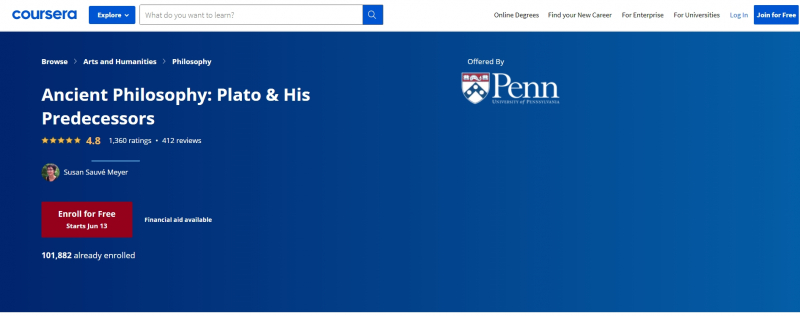Ancient Philosophy: Plato & His Predecessors Offered By University of Pennsylvania
What is philosophy, exactly? What distinguishes it from science, religion, and other forms of human communication? The foundations of philosophy in the Western tradition can be traced back to Ancient Greek thinkers in this course. The Presocratic natural philosophers, who lived in Ionia in the 6th century BCE and are credited with being the first scientists, are our starting point. Thales, Anaximander, and Anaximines made bold claims regarding reality's ultimate elements, whereas Heraclitus claimed that the shifting universe has an underlying order. Later Greek theorists (such as Anaxagoras and the atomist Democritus) attempted to respond to Parmenides of Elea's robust rejection to all of these suggestions. Socrates insisted on the relevance of the fundamental ethical question—"How should one live?".
Ancient Philosophy: Plato & His Predecessors Offered By University of Pennsylvania ranks top on the list of the Best Online Philosophy Courses. Socrates emphasized the importance of the fundamental ethical question, "How shall I live?" in fifth-century Athens, and his pupils, Plato and Plato's pupil, Aristotle, built intricate philosophical systems to explain the nature of reality, knowledge, and human happiness. Epicureans and Stoics extended and altered Aristotle's previous legacy after his death in the Hellenistic period. All of these thinkers' major doctrines will be examined. Part I will focus on Plato and his forefathers. Aristotle and his successors will be discussed in Part II.
This course offers:
- Flexible deadlines: Reset deadlines in accordance to your schedule.
- Certificate : Earn a Certificate upon completion
- 100% online
- Beginner Level
- Approx. 13 hours to complete
- Subtitles: Arabic, French, Portuguese (European), Italian, Vietnamese, German, Russian, Turkish, English, Spanish
Coursera Rating: 4.8/5.0
Enroll here: https://www.coursera.org/learn/plato












